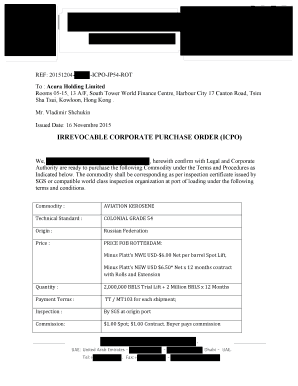Fill and Sign the Irrevocable Corporate Purchase Order Sample Form

Practical suggestions for completing your ‘Irrevocable Corporate Purchase Order Sample’ online
Are you exhausted by the inconvenience of dealing with documentation? Look no further than airSlate SignNow, the leading digital signature platform for both individuals and businesses. Bid farewell to the lengthy process of printing and scanning documents. With airSlate SignNow, you can easily complete and sign documents online. Take advantage of the extensive features packed into this user-friendly and cost-effective platform and transform your document management lifecycle. Whether you need to endorse forms or collect digital signatures, airSlate SignNow simplifies the process with just a few clicks.
Adhere to these comprehensive instructions:
- Log into your account or initiate a free trial with our service.
- Click +Create to upload a document from your device, cloud storage, or our template collection.
- Open your ‘Irrevocable Corporate Purchase Order Sample’ in the editing tool.
- Click Me (Fill Out Now) to prepare the document on your end.
- Add and designate fillable fields for additional parties (if needed).
- Proceed with the Send Invite settings to solicit eSignatures from others.
- Download, print your version, or convert it into a reusable template.
Don’t worry if you need to collaborate with your teammates on your Irrevocable Corporate Purchase Order Sample or send it for notarization—our solution provides everything necessary to accomplish these tasks. Sign up with airSlate SignNow today and elevate your document management to unprecedented levels!
FAQs
-
What is an Irrevocable Corporate Purchase Order Sample?
An Irrevocable Corporate Purchase Order Sample is a legally binding document that confirms the purchase of goods or services between a buyer and a seller. This sample serves as a template, ensuring that all necessary details are included, such as terms of payment, delivery dates, and other essential conditions.
-
How can I create an Irrevocable Corporate Purchase Order Sample using airSlate SignNow?
Creating an Irrevocable Corporate Purchase Order Sample with airSlate SignNow is simple and efficient. You can use our intuitive templates to customize your order, adding your company details and specific terms, then easily send it for eSignature to finalize the process.
-
What are the benefits of using an Irrevocable Corporate Purchase Order Sample?
Using an Irrevocable Corporate Purchase Order Sample streamlines your purchasing process by providing a clear, standardized format that minimizes confusion. It enhances accountability and ensures that both parties agree on the transaction details, thereby reducing the risk of disputes.
-
Is there a cost associated with obtaining an Irrevocable Corporate Purchase Order Sample from airSlate SignNow?
While airSlate SignNow offers free trials for new users, accessing an Irrevocable Corporate Purchase Order Sample may depend on your chosen pricing plan. Our plans are designed to be cost-effective, providing great value for businesses looking to enhance their document management.
-
Can I integrate airSlate SignNow with other business tools for managing Irrevocable Corporate Purchase Orders?
Yes, airSlate SignNow integrates seamlessly with various business tools, such as CRM systems and accounting software, making it easier to manage your Irrevocable Corporate Purchase Orders. These integrations allow for a more streamlined workflow, ensuring that you can track and manage documents efficiently.
-
What features does airSlate SignNow offer for managing Irrevocable Corporate Purchase Orders?
airSlate SignNow provides features such as customizable templates, electronic signatures, and real-time tracking for managing Irrevocable Corporate Purchase Orders. These tools help you automate the signing process and keep all stakeholders informed, enhancing productivity.
-
How secure is my data when using an Irrevocable Corporate Purchase Order Sample with airSlate SignNow?
Security is a top priority at airSlate SignNow. When using an Irrevocable Corporate Purchase Order Sample, your data is protected with industry-standard encryption and secure storage, ensuring that your sensitive information remains confidential and safe.
Find out other irrevocable corporate purchase order sample form
- Close deals faster
- Improve productivity
- Delight customers
- Increase revenue
- Save time & money
- Reduce payment cycles

